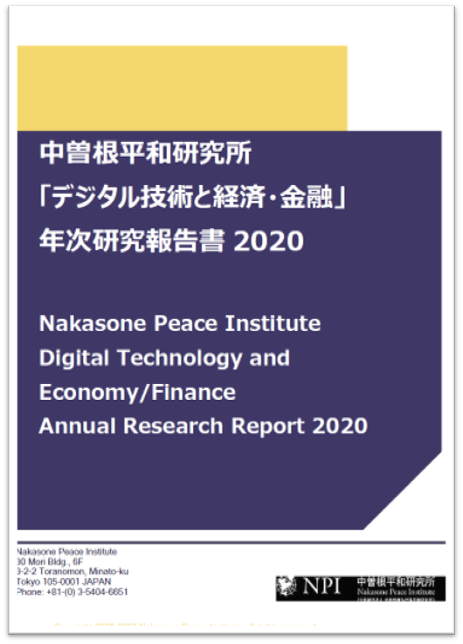2020/03/27
"Securing economic resilience with digital" fights the novel coronavirus by Yuichi Iwata (Senior Research Fellow)
"Securing economic resilience with digital" fights the novel coronavirus
Yuichi Iwata, Senior Research Fellow
(As of 00:30 27th March 2020, GMT)
■The novel coronavirus, movement restrictions, and cash inflow restrictions
The global expansion of the novel coronavirus (2019nCoV) clears the slowdown of the global economy. The "Macro dashboard" operated by Blackrock, a global investment company, has four items related to the world's major economies: "Growth", "Financial conditions", "Inflation" and "Trade". Except "Inflation", all the other three have already been declining since 2018 or recently. [1]
To prevent this expansion, domestic and international movement restrictions have also been expanded. IATA (International Air Transport Association) updates information related to restrictions on immigration in each country as much as possible. According to this, as of March 27, 172countries and regions have been implemented any boarder restrictions. [2]
With limited freedom of movement, not only the production in factories, but also the consumption of luxury services and luxury goods are slowing. This statistically leads to a drop in productivity. That is, the movement restriction and the slowdown in the economy form a kind of cycle.
If income continues to fall below the break-even point level, with little flexibility of fixed costs, some companies might meet the difficulty of continuing its business due to cash flow.
When this kind of situation spreads, the financial institutions lending to these companies will increase their burden and their balance sheets will deteriorate. Moreover, it is also necessary to pay attention to the correlation between business relationships between such companies. [3]
■Utilizing digital technology to secure economic resilience to the novel coronavirus
On the other hand, some companies and organizations expanding the telecommuting at this time can be a major step toward improving digital productivity.
However, according to Global Workplace Analytics, one of the leading telecommuting analyzing specialists, the attributes of telecommuters by industry compiled based on data from the 2016 American Community Survey (ACS: a sample survey by the US Census Bureau of 3 million households) are: 12% for professional, scientific and technical services, 10% for information, 9% for finance and insurance, and 8% for real estate. This means the major attributes of telecommuting in non-manufacturing industries, which could not be expected to have immediately improvement of productivity in the manufacturing industries. [4]
Whereas, according to an OECD survey, productivity is still lower in non-manufacturing industries than in manufacturing [5]. Therefore, taking advantage of this opportunity, if non-manufacturing firms can better use telecommuting, they may lead to productivity improvement in non-manufacturing industries and lead to higher productivity in the economy as a whole. For this, technical (foundation & application), skill and cultural considerations are required. [6]
In addition, every rule that is relaxed in an emergency also trigger a reassessment of the level of necessity in peacetime.
For example, with regard to the occupation of goods that occur everywhere in the world, it is important to deal with inventory management and inventory forecasting. Even in the normal case of tight management to minimize inventory and intentional purchase promotion (induction) through marketing, it is necessary to loosen or change this into affordable one in such an emergency.
CFO.com pointed out four viewpoints that are valid not only for the CFO but also for the general theory: 1) "Expose Exposure." (What do we know, understand and share?) 2) "Unlock the (organized) budget." 3) "Learn the (operable) levers." 4) "Speak to the Financial Sponsors." [7]
■Economic security and financial security, under the novel coronavirus expansion
To review these normal times and to take new initiatives in emergencies will enhance long-term economic resilience.
In such a situation, as mentioned at the beginning, attentions to the risks of inadvertently stopping "the blood flow of the economy" are constantly needed.
One of the global challenges is to keep the supply chains.
After 'a kind of excess demand' has been removed, is it possible to continue stable production of goods that are needed on a daily basis? Until World War II, when the economy was basically closed to a single country, a wartime-controlled economy might have been able to maintain such a production system to keep a balance between supply and demand. However now, in the era of the globally extended supply chains, how should these be secured? This problem is a kind of economic security issue.
As another global challenge, for supporting the global supply chains, it is important that producers secure stable liquidity. In the United States, Europe and Japan, the governments are continuing to consider measures to temporarily ease the balance sheet regulations with financial institutions, so that they can continue to supply capital to production goods companies [8]. This is a kind of financial security issue.
In particular, such a liquidity risk may be relatively high in regions and industries where private (non-financial) corporate debt is high relative to GDP (Gross Domestic Product). This is because the decline in GDP with the spread of the new coronavirus is likely to be highly sensitive to the repayment of corporate debt. China ranks second only to Hong Kong, according to this January report of the International Finance Institute (IIF). [9]
"Economic blood flow" risk may be more prevalent in countries than the novel coronavirus. It is necessary to keep an eye on the economic and financial situation of each country.
*Japanese original version of the commentary, please find at: (http://www.iips.org/research/2020/)
[1]Please see the Blacklock site(https://www.blackrock.com/corporate/insights/blackrock-investment-institute/interactive-charts/macro-dashboard) Accessed on 23rd March, 2020.
[2]Please see the IATA site(https://www.iatatravelcentre.com/international-travel-document-news/1580226297.htm)Accessed on 24th March, 2020.
[3] For example, please see the Fitch Ratings' financial sector assessment report (https://www.fitchratings.com/site/pr/10114289) Accessed on 24th March, 2020.
[4] Please see the site of Global Workplace Analytics(https://globalworkplaceanalytics.com/telecommuting-statistics)Accessed on 24th March, 2020.
[5] Please see the OECD report(http://www.oecd.org/officialdocuments/publicdisplaydocumentpdf/?cote=ECO/WKP(2018)79&docLanguage=En)Accessed on 24h March, 2020.
[6] For example, please see the ZDNet report (https://www.zdnet.com/article/effective-strategies-and-tools-for-remote-work-during-coronavirus/) Accessed on 24th March, 2020.
[7]Please see the CFO.com site(https://www.cfo.com/budgeting/2020/03/the-cfos-response-to-coronavirus-uncertainty/) Accessed on 24h March, 2020.
[8]Regarding the worldwide movement, please see the Basel Committee press release on the bank for international settlement (BIS) site ((https://www.bis.org/press/p200320.htm) Accessed on 24h March, 2020.
[9]Please see the IIF report, page 6 (https://www.iif.com/Portals/0/Files/content/Global%20Debt%20Monitor_January2020_vf.pdf)Accessed on 24h March, 2020.





